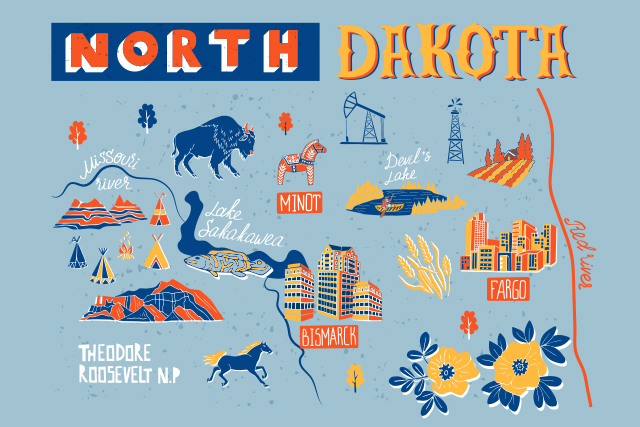North Dakota voters passed an initiative to legalize medical marijuana in 2016, and the state’s two growers and eight dispensaries have been operational and serving patients since 2019.
Although the state has kept the number of dispensaries extremely low to control supply, access to medical marijuana is growing. The original law listed 13 eligible conditions, and 12 more have been added since, along with all terminal illnesses.
There are over 5,000 active patient cards for medical marijuana. Recreational cannabis remains illegal in the state, but there are advocacy groups currently collecting signatures to qualify adult-use cannabis as a constitutional amendment on the 2022 ballot.
If you’re seeking to get your MMJ card in North Dakota, here’s everything you need to know.
Quick Guide to North Dakota MMJ
To apply for your medical marijuana card in North Dakota, you need to:
- Check Your Eligibility: To get an MMJ card, North Dakotans will need to meet certain qualifying criteria. You must be 19 or older, a resident of North Dakota, and be diagnosed with one of the conditions listed below.
- Contact a Physician: To obtain a medical marijuana card, a doctor must deem it necessary. In North Dakota, you need a recommendation from a healthcare provider with whom you have an established doctor/patient relationship, typically a primary care physician. Heally makes it easy to connect with a doctor in your state for a virtual consultation.
- Complete Your Application and Get Your Card: After getting a physician’s recommendation you need to register on the North Dakota Medical Marijuana Patient Registry. You can then submit an application through the registry and receive a Medical Marijuana Card.
How to Get a North Dakota Medical Cannabis Card in Three Steps
Check Your Eligibility

You need an official diagnosis of one of the qualifying conditions to be eligible for an MMJ card in North Dakota. The current list of qualifying conditions includes:
- Alzheimer’s disease or related dementia
- Amyotrophic lateral sclerosis (ALS), or Lou Gehrig’s disease
- Anorexia nervosa
- Anxiety disorder
- Autism spectrum disorder
- Brain injury
- Bulimia nervosa
- Cancer
- Cachexia/wasting syndrome
- Causalgia
- Chronic inflammatory demyelinating polyneuropathy
- Chronic pain
- Crohn’s disease
- CRPS (complex regional pain syndrome Type II)
- Dystonia
- Interstitial cystitis
- Migraine
- Neuropathy
- Post-traumatic stress disorder (PTSD)
- Rheumatoid arthritis
- Spinal stenosis
- Terminal illness
- A chronic or debilitating disease or medical condition in which treatment produces one or more of the following:
- Cachexia, or wasting syndrome
- Intractable nausea
- Seizures
- Severe debilitating pain that has not responded to conventional treatment for more than three months, or for which other treatment options produced serious side effects
- Severe and persistent muscle spasms, including multiple sclerosis
Get a Recommendation From a Physician

In North Dakota, medical marijuana legislation requires you to have a “bonafide” relationship with the health care provider that is giving your recommendation. This means:
- The provider has reviewed your medical records and created and maintained their own medical records for you.
- The provider has completed an in-person medical evaluation for you.
- You are under the provider’s continued care for the debilitating medical condition(s) that qualify you for the program. You will have follow-up care and will be monitored while in the program.
- You are not seeing the provider for the sole purpose of having a written certification completed. Instead, you are established with the provider for comprehensive care of a debilitating medical condition
If you don’t have a health care provider willing to write you a recommendation, state laws do not prohibit you from establishing care with another physician, but you will still have to meet the requirements of a bonafide relationship to be accepted.
If you’re looking to meet with a new provider, you can quickly and easily connect with a medical cannabis doctor by signing up with Heally. You can discuss treatment options, your medical history, and determine if pursuing a medical marijuana card is the best choice for you.
Complete Your Application
Applications can be completed online, and must include:
- 2×2 Passport Style Photo to go on your ID card if approved
- Copy of State Issued Identification Card or Driver’s License
- Name and email address of Health Care Provider completing the written certification
After submitting your application, the state’s Division of Medical Marijuana will approve or deny your application. There is a non-refundable application fee of $50.

